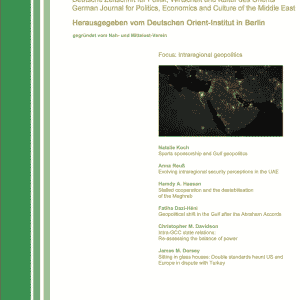Shop
Showing 145–160 of 349 resultsSorted by latest
-

Afghanistan: A tragic fall, consequences and prospects
7,90 €incl. VAT
Add to basket -

NATO’s 2022 Strategic Concept reconsiders the MENA and southern partners
7,90 €incl. VAT
Add to basket -

The EU Gulf strategy and the Strategic Compass: Europe’s gamble for a security role in a multipolar Gulf
7,90 €incl. VAT
Add to basket -

G7, food security and MENA
7,90 €incl. VAT
Add to basket -

Global power competition and the geopolitics of energy
7,90 €incl. VAT
Add to basket -

Global systems and the MENA region: Weakening actors, weakening systems
7,90 €incl. VAT
Add to basket -

Sports sponsorship and Gulf geopolitics
7,90 €incl. VAT
Add to basket -

Evolving intraregional security perceptions in the UAE
7,90 €incl. VAT
Add to basket -

Stalled cooperation and the destabilisation of the Maghreb
7,90 €incl. VAT
Add to basket -

Geopolitical shift in the Gulf after the Abraham Accords
7,90 €incl. VAT
Add to basket -

Intra-GCC state relations: Re-assessing the balance of power
7,90 €incl. VAT
Add to basket -

Sitting in glass houses: Double standards haunt US and Europe in dispute with Turkey
7,90 €incl. VAT
Add to basket -

Orient III 2022: Intraregional geopolitics
26,00 €incl. VAT
plus Shipping Costs
Select options This product has multiple variants. The options may be chosen on the product page -

A nuanced look and equal footing – Expectations towards the new German government: A view from Cairo
7,90 €incl. VAT
Add to basket -

The impact of civil society on building democracy and promoting liberalism in Tunisia
7,90 €incl. VAT
Add to basket -

Towards a more active role for Germany in Palestine
7,90 €incl. VAT
Add to basket


